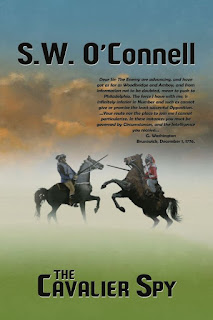Name:
Christopher G. Nuttall
Book Title:
Trial By Fire
Genre: Fantasy
Publisher:
Twilight Times Books
Thank you for your time in
answering our questions about getting published. Let’s begin by having
you explain to us why you decided to become an author and pen this book?
Author: Well, that’s two
separate issues. The blunt truth is that
I saw a book I thought was a great idea, but really poorly executed, back in
2005, so I started to write a version of my own. My version wasn’t much better, but at least
it was a start. Six years later, or
thereabouts, I started to put together an outline for what would become the
Schooled In Magic series.
Is this your first book?
Author: No. Trial By Fire is somewhere around my fiftieth
published book, counting both indie and traditional published books. It’s also book seven in the Schooled In Magic
series.
With this particular book, how
did you publish – traditional, small press, Indie, etc. – and why did you
choose this method?
Author: Trial By Fire is
published by Twilight Times Books, a small America-based press. Like most writers, I wanted to be published
by a traditional publisher, so I submitted the first book in the series and
everything just went on from there.
Can you tell us a little about
your publishing journey? The pros and
cons?
Author: To be frank, being
published by a traditional publisher lends a certain degree of validation to
the author. Someone has actually paid
money to have this book edited, ergo they must think they can claw back the
money, ergo they think the book’s good.
(The author is seen as an investment.)
The publisher also takes care of editing, obtaining a cover design and
everything else the book might need, which frees up more of the author’s time
for writing.
The cons, however, is that you
give up a great deal of control. I
haven’t had any problems with TTB, but I’ve heard hundreds of horror stories
from other authors who tangled with the wrong publisher. Do some research before choosing a
publisher. There’s also a delay between
submission and publication that can be annoying, although getting the book
edited is well worth the time.
What lessons do you feel you
learned about your particular publishing journey and about the publishing
industry as a whole?
Author: Do my research
<grin>. I think that’s really the
most important lesson of all.
But the publishing industry
itself is changing. The rise of eBooks
put power in the hands of the authors, rather than publishers, and while the
bigger publishing houses have done their level best to argue otherwise, I think
its inarguable that big publishing will have to adapt quickly or go the way of
the dinosaurs. Small presses - and Baen
Books - tend to be far better at adapting to the changing scene.
Would you recommend this method
of publishing to other authors?
Author: It depends, really, on
what they want from publishing. Having
assistance from a small publisher is worth its weight in gold, so I’d recommend
it to anyone who intends to write for the long haul.
What’s the best advice you can
give to aspiring authors?
Author: I think the best advice
would be to get some critics - and then listen to them.
Yes, I know; it isn’t easy to
put up with someone being critical about our work. We pour our heart and souls into the
manuscript and it hurts - it really hurts - to watch someone tear it apart. But a decent critic and a good editor are
really worth their weight in gold. They
can make the difference between getting good reviews - and a good start in
writing - or being crushed under a wave of negative reviews.
Frankly, there are quite a few
well-established authors who have become editor-proof (I’m sure any well-read
person can name a few) and their works rapidly become unreadable. Forgetting that you need an editor is
disastrous in the long term.
And grow a thick skin. You’ll need it.







